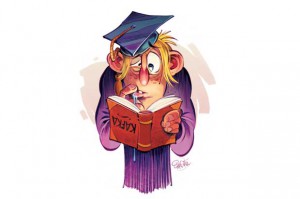Labor is probably right in saying that fee deregulation will reduce the number of students attending university. One certainly hopes so. Undergraduate study in Australia is so affordable and accessible that it is packed to bursting with illiterates and dilettantes, and higher education is suffering as a result. Bring on the cull.
Almost twice as many Australian students finish high school now than did thirty years ago – 46% then compared to nearly 90% now. Put that change down to the systematic retardation of the secondary school system.
It’s not the case that a higher percentage of students are capable of matriculating; it’s that matriculation has been dumbed down to accommodate a higher percentage of students. Exams are less frequent and less strenuous. Courses like Nutrition and Tourism have been dreamt up so that the incapable need not actually study Biology or Economics, and something very strange indeed has happened to good old Geography.
Hordes of students who have been failed by our high schools (or rather, not failed by our high schools) are ushered into university totally unequipped for the rigours of undergraduate study.
As a result many undergraduate courses have been rejigged to accommodate a poorly educated cohort. Real world necessity ensures that some subjects retain high standards; if the engineering faculty started going soft we would notice that all our new bridges fell down, and if the medical school slackened we would observe dwindling life expectancies.
However, faculties without immediate checks and balances – law, education, the arts, social sciences, architecture – have the luxury of setting their own pace. The result has not been pretty.
The ongoing decline in standards cannot be written off as wishy washy nostalgia for ye olde times, when every exam had to be sat in Latin, except the Latin exam, which had to be sat in Greek. To chart the fall of the academy we need only hark back to a time five or six years ago, when one could still actually study Latin there. Even the best Australian universities have now mostly phased out antique languages, observing that students are no longer up to the challenge.

According to the most recent Times Higher Education world university rankings, Australian universities have started to slip, and Asian universities are on the rise. Education is our biggest international service export – mostly to Asian students who pay far more to study than Australian citizens. If we stop being demonstrably superior to our geographical competitors it won’t just be our education system that stalls, but our economy as well.
In place of real subjects, sandstone universities like my alma mater, the University of Adelaide, have adopted nonsense courses in the hope of keeping students ‘engaged’.
The English Literature department now offers Workplace Writing, which promises to ‘develop skills in creating effective public presentations’ (read: ‘make your own powerpoint’). There’s something Kafkaesque about a literature course which verses people in the language of bureaucracy. Indeed, there’s something Kafkaesque about English departments full of students who wouldn’t understand what ‘Kafkaesque’ means.
Looking for something a little more intellectual? Why not try 1960s: From Beats to Bongs, in which a week is devoted to studying The Beatles’ Help! (because, one assumes, Sgt. Peppers was too highbrow, and The White Album might be deemed a smidge racist). From Beats To Bongs also begs the question; was it titled clumsily, or does the course really only cover subjects ranging alphabetically from BE – BO? Where is the wisdom we have lost in knowledge? Where is the knowledge we have lost in allowing the non-scholastic to study the liberal arts?
The observation that university faculties are faltering isn’t new. In 1987, Allan Bloom’s The Closing of the American Mind made the case that higher education was failing western democracies. He argued that post-modern culture was doing away with the canon, that moral relativism had spread like the plague, and that the academy was failing to drill crucial lessons into the best and brightest.
The problem facing Australian universities today is distinctly different; now, democracy is failing higher education. Now, the best and brightest haven’t been taught how to put an essay together. They sit in classrooms saturated by dunces, and are hardly trusted to read highbrow works at all, canon or otherwise.
By the time I finished my B.A. at the University of Adelaide in 2011, the feats of academic grotesquery I had witnessed – by faculty and students alike – were legion. In an effort to keep students on campus the library massively reduced the space allocated to books to make room for cafes and Xboxes. In some liberal arts honours years, advanced courses were replaced with 2nd year subjects, as if to tacitly acknowledge that nobody was actually learning anything.
I vividly recall an occasion in my final year of study when a girl with whom I shared a Gothic Literature course (no books over 150 pages), who was about to finish her Arts/Education double degree, put her hand up to ask the lecturer, entirely genuinely, what she was supposed to tell her future high school students if one day required to teach a book not covered in the course. If she did indeed graduate, she is teaching actual classes now, though Lord knows what. It chills the blood.
Yes, if the Abbott government’s proposed changes are passed, the price of an education will increase, and yes, the number of students willing to burden themselves with HECS debt will decrease. Those who will opt not to go will be those who don’t believe they will sufficiently benefit from an education to eventually pay back the loans: people who aren’t actually interested in learning.
Is it all an elitist ploy, as Labor claims? It absolutely is, and we should be thrilled. If you can’t have elitism in higher education, where can you have it?
Got something to add? Join the discussion and comment below.
Get 10 issues for just $10
Subscribe to The Spectator Australia today for the next 10 magazine issues, plus full online access, for just $10.
You might disagree with half of it, but you’ll enjoy reading all of it. Try your first month for free, then just $2 a week for the remainder of your first year.













Comments
Don't miss out
Join the conversation with other Spectator Australia readers. Subscribe to leave a comment.
SUBSCRIBEAlready a subscriber? Log in